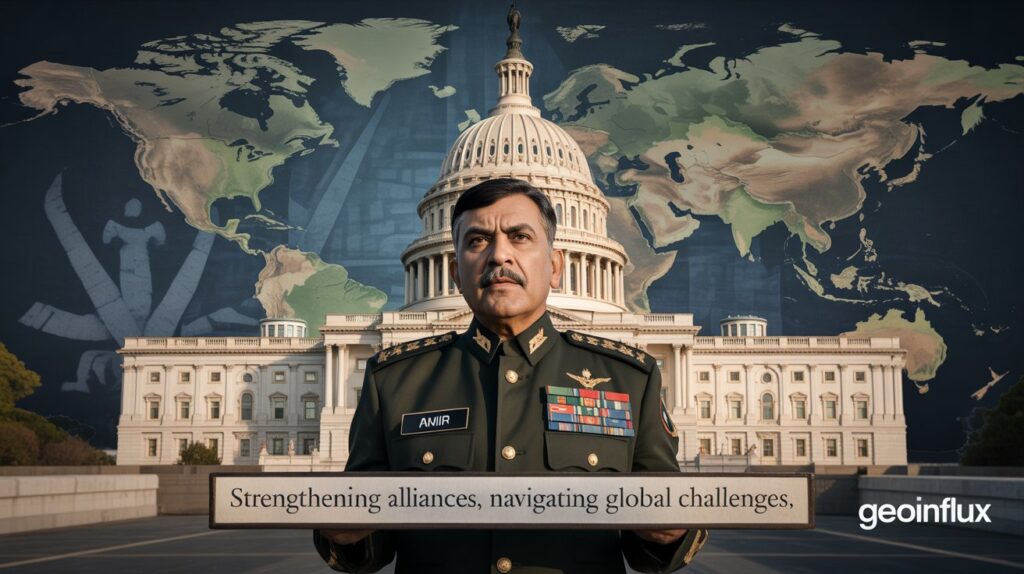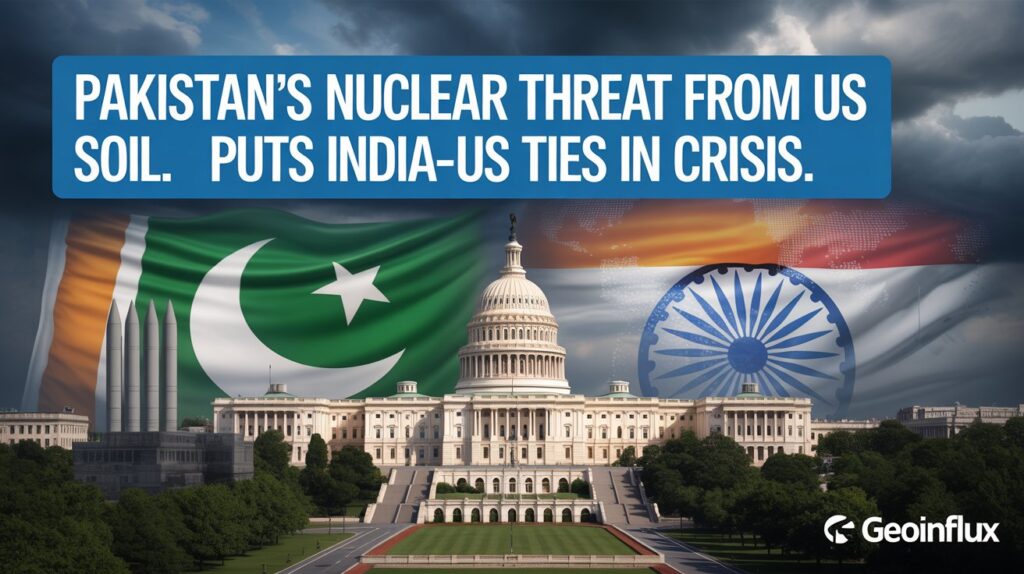Pakistan Nuclear Threat From US Soil Puts India-US Ties in Crisis as Army Chief Asim Munir issues a nuclear warning while in the US. Tensions rise with four threats in 48 hours, testing New Delhi’s diplomacy ahead of PM Modi’s UNGA decision.
New Delhi, India – The fragile balance between South Asia’s two nuclear powers has been jolted as Pakistan Nuclear Threat From US Soil Puts India-US Ties in Crisis. In just 48 hours, Pakistan issued four threats to India, including a rare and alarming nuclear statement made in the United States by Army Chief Asim Munir.
This spike in hostile rhetoric marks a sharp departure from Islamabad’s recent posture of cautious diplomacy, a shift many analysts attribute to growing US engagement and support.
Also Read:
Munir’s repeated visits to Washington, coupled with new US-Pakistan security dialogues, have signalled to New Delhi that Washington may be recalibrating its South Asia strategy.
Pakistan Nuclear Threat From US Soil Puts India-US Ties in Crisis: A Dangerous Turn
The most striking development came when Asim Munir delivered a nuclear warning to India while on American soil. The Indian Ministry of External Affairs swiftly condemned the comments, warning that they cast serious doubt over the safety and responsibility of Pakistan’s nuclear arsenal.

Islamabad has not denied Munir’s words; instead, it has accused India of “exaggerating” the threat. But this is far from an isolated incident. Just days earlier, Prime Minister Shahbaz Sharif publicly warned of military action should India disrupt Pakistan’s water supply.
Together, these threats, issued by both Pakistan’s civilian and military leadership, have raised alarms in New Delhi, with policymakers viewing them as a sign of emboldened Pakistani confidence.
Why Washington’s Actions Matter
The Pakistan Nuclear Threat From US Soil Puts India-US Ties in Crisis episode cannot be separated from the United States’ recent policy shifts. When asked about the nuclear remarks, a US State Department spokesperson stressed that Washington enjoys “good relations” with both nations and remains committed to working with each.
However, the US has also launched a counter-terrorism forum with Pakistan, a move widely interpreted as a gateway to renewed financial aid, intelligence, and possibly military. This is a stark contrast to Washington’s stance under Donald Trump, who cut assistance and labelled Pakistan a haven for terrorists, even accusing it of sheltering Osama bin Laden.
The Policy U-Turn: From ‘Lies & Deceit’ to Strategic Partner
During his first term, Donald Trump openly criticised Pakistan, saying it gave “nothing but lies and deceit” despite receiving $33 billion in aid over 15 years. That era saw a deep freeze in military cooperation.
The current trajectory appears to be the opposite. Analysts suspect the shift may be linked to US strategic needs in the event of a confrontation with Iran, in which Pakistan’s airbases, intelligence networks, and military manpower could be valuable assets.
For India, this US tilt toward Pakistan is worrying, particularly when accompanied by nuclear rhetoric from Islamabad.
India’s Diplomatic Dilemma, Pakistan Nuclear Threat From US Soil Puts India-US Ties in Crisis
With Pakistan Nuclear Threat From US Soil Puts India-US Ties in Crisis, Prime Minister Narendra Modi faces a crucial foreign policy decision: Should he attend next month’s United Nations General Assembly (UNGA) in New York and potentially meet Donald Trump, or skip the visit as a show of disapproval toward Washington’s Pakistan policy?
The decision is complicated by history. After the G7 Summit, Modi declined an invitation from Trump to visit the US. Yet, avoiding UNGA now could risk losing opportunities for economic engagement and investment from the US.
It is a high-stakes choice between diplomatic signalling and economic pragmatism.
Strategic Implications for South Asia
Pakistan Nuclear Threat From US Soil Puts India-US Ties in Crisis brings several strategic realities into focus:
- Nuclear tensions are no longer limited to South Asian soil; threats are now being voiced internationally.
- US-Pakistan engagement has returned in a way that could alter India’s security calculus.
- India’s foreign policy must balance assertive responses with the need for sustained global partnerships.
Pakistan Nuclear Threat From US Soil Puts India-US Ties in Crisis Summary
| Development | Details | Strategic Impact |
|---|---|---|
| 4 threats in 48 hours | Nuclear and water-related warnings from Pakistan’s leaders | Escalates bilateral tensions |
| Nuclear threat from US soil | Globalises the nuclear discourse | Modi’s UNGA decision is pending |
| US–Pakistan counter-terror forum | Possible aid and cooperation revival | Boosts Pakistan’s confidence |
| Modi’s UNGA decision pending | No confirmation on visit | Tests India’s diplomatic agility |
Frequently Asked Questions
1. What does “Pakistan Nuclear Threat From US Soil Puts India-US Ties in Crisis” refer to?
It refers to Pakistan Army Chief Asim Munir’s nuclear warning to India made while in the United States, and the resulting strain on India-US relations.
2. Why is this significant?
It is unusual for nuclear threats to be issued from foreign soil, especially in the capital of a key global player like the US.
3. How has India responded?
India has condemned the statements and is reevaluating its diplomatic approach toward Washington.
4. What role is the US playing?
The US has recently reengaged with Pakistan, opening security forums that may lead to renewed aid.
5. Could this affect PM Modi’s US trip?
Yes. The decision to attend UNGA could be influenced by Washington’s current tilt toward Pakistan.
Conclusion
The episode in which Pakistan Nuclear Threat From US Soil Puts India-US Ties in Crisis has underlined the fragile nature of South Asia’s security environment. For New Delhi, the challenge is not only in countering Pakistan’s aggressive posture but also in navigating Washington’s shifting alliances.
The coming weeks — and the decision over PM Modi’s UNGA attendance — will signal how India intends to manage its relationships amid this new and complex geopolitical reality.
Related Posts
- India’s S-400 Missile Defense System Downs 6 Pakistani Jets in Operation Sindoor – Unseen Footage & Details Emerge
- Breaking: Donald Trump India Pakistan War Claims Resurface, 5 Alarming Facts Fueling Global Tensions
- Top 7 Aggresive Strategic Shifts in India’s Foreign Policy in a Multipolar World: Strategic Autonomy Amid Shifting Alliances
References
- U.S. Department of State – Official Statements on India–U.S. Relations
https://www.state.gov/ - Ministry of External Affairs, Government of India – Press Releases on Strategic and Security Issues
https://mea.gov.in/ - Congressional Research Service – Pakistan’s Nuclear Weapons and U.S. Security Policy
https://crsreports.congress.gov/ - The Diplomat – U.S.-Pakistan Relations and Nuclear Security Concerns
https://thediplomat.com/ - Carnegie Endowment for International Peace – Nuclear Stability in South Asia
https://carnegieendowment.org/ - Hindustan Times – India-U.S. Strategic Partnership Under Pressure Over Security Threats
https://www.hindustantimes.com/ - Brookings Institution – The U.S.-Pakistan Relationship and its Impact on India
https://www.brookings.edu/





Pingback: US Dollar Future in Crisis: 7 Shocking Reasons BRICS Revolt Could End Dollar Dominance - GeoInflux
Keep working ,remarkable job!